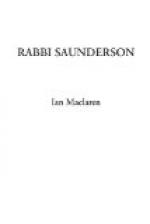“Now,” said Kate, when Barbara had brought her commands in with incredible celerity, “bring up some fresh milk and three glasses of whisky.”
“Whisky!” Barbara could hardly compass the unfamiliar word. “The Doctor never hed sic a thing in the hoose, although mony a time, puir man . . .” Discipline was softening even that austere spirit.
“No, but you have, for you are blowing a full gale just now; bring up your private bottle, or I’ll go down for it.”
“There’s enough,” holding the bottle to the light, “to do till evening; go to the next farm and send a man on horseback to tell Mr. Carmichael, of Drumtochty, that Doctor Saunderson is dying, and another for Doctor Manley of Muirtown.”
Very tenderly did Kate sponge the Rabbi’s face and hands, and then she dressed his hair, till at length he came to himself.
“This ministry is . . . grateful to me, Barbara . . . my strength has gone from me . . . but my eyes fail me. . . . Of a verity you are not . . .”
“I am Kate Carnegie, whom you were so kind to at Tochty. Will you let me be your nurse? I learned in India, and know what to do.” It was only wounded soldiers who knew how gentle her voice could be, and how soft her hands.
“It is I that . . . should be serving you . . . the first time you have come to the manse . . . no woman has ever done me . . . such kindness before. . . .” He followed her as she tried to bring some order out of chaos, and knew not that he spoke aloud. “A gracious maid . . . above rubies.”
His breathing was growing worse, in spite of many wise things she did for him—Doctor Manley, who paid no compliments, but was a strength unto every country doctor in Perthshire, praises Kate unto this day—and the Rabbi did not care to speak. So she sat down by his side and read to him from the Pilgrim’s Progress—holding his hand all the time—and the passage he desired was the story of Mr. Fearing.
“This I took very great notice of, that the valley of the shadow of Death was as quiet while he went through it as ever I knew it before or since. I suppose these enemies here had now a special check from our Lord and a command not to meddle until Mr. Fearing was passed over it. . . . Here also I took notice of what was very remarkable: the water of that river was lower at this time than ever I saw it in all my life. So he went over at last, not much above wet-shod. When he was going up to the gate . . .”
The Rabbi listened for an instant.
“It is John’s step . . . he hath a sound of his own . . . my only earthly desire is fulfilled.”
“Rabbi,” cried Carmichael, and half kneeling, he threw one arm round the old man, “say that you forgive me. I looked for you everywhere on Monday, but you could not be found.”
“Did you think, John, that I . . . my will was to do you an injury or . . . vex your soul? Many trials in my life . . . all God’s will . . . but this hardest . . . when I lost you . . . nothing left here . . . but you . . .—my breath is bad, a little chill—. . . do you understand?”




